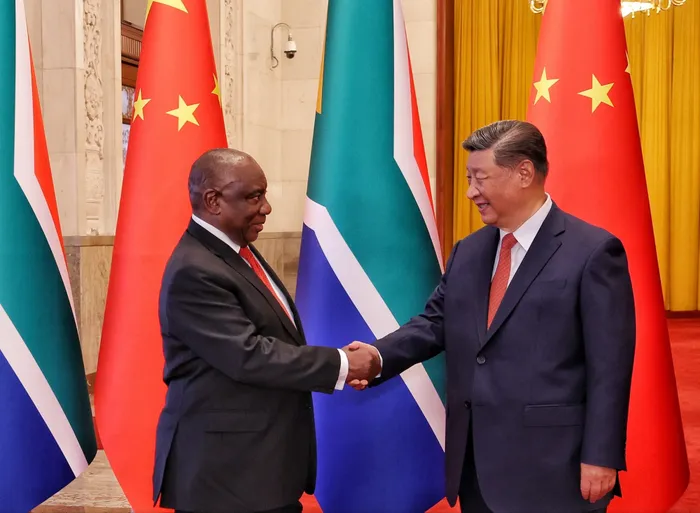Foreign Policy: South Africa Asserts Its Sovereignty With Clear Stance On Taiwan

President Cyril Ramaphosa last year visited China on a State Visit, where he was hosted by President Xi Jinping. During the trip, Ramaphosa emphasised that South Africa embraces the One-China Policy. By revoking its diplomatic relations with Taiwan, South Africa recognized the PRC as the only legitimate representative of the Chinese people, says the writer.
Image: GCIS
Prof. David Monyae
The South African government, through the Department of International Relations and Cooperation (DIRCO), recently sent a letter to the Taipei Liaison Office (TLO) to relocate its offices from Pretoria, South Africa’s capital, to Johannesburg or any other part of the country.
Taiwan has been given until the end of March to move its office. The latest letter followed previous requests first made in December 2023, April and October 2024 which seemingly fell on deaf ears.
Taiwan was given six months to move its offices – an ultimatum that it failed to respect.
Last October, DIRCO explained that Taiwan moving its Liaison Office to Johannesburg and changing its name to a Trade Office was part of standard diplomatic practice. It further contended that such a move would be a true reflection of the non-political and non-diplomatic nature of the relationship.
South Africa severed ties with Taiwan in 1998 when it established official diplomatic relations with the People’s Republic of China (PRC). South Africa and Taiwan agreed to replace the Taiwanese Embassy with a TLO which was eventually opened in Pretoria.
Although Taiwanese officials at the TLO would still enjoy some diplomatic privileges, diplomatic relations between the two countries were abolished. The TLO was earmarked to facilitate economic relations between Taiwan and South Africa. South Africa hosts over 400 factories built by Taiwanese investors. The two sides also have a two-way trade of US$2 billion.
By revoking its diplomatic relations with Taiwan, South Africa recognized the PRC as the only legitimate representative of the Chinese people. This was in line with South Africa’s endorsement of the One China policy which it continues to respect to date.
During his state visit to China last year, South African President Cyril Ramaphosa reiterated his government’s continued support of and commitment to the One China policy as a key element in the two countries’ comprehensive strategic partnership.
However, in response to South Africa’s latest request, Taiwan has clearly said it will not accept the request. It also argues that South Africa has taken a unilateral decision which undermines the current negotiations on the issue underway between Taipei and Pretoria.
However, this argument conveniently omits to mention that South Africa placed its request over a year ago without any response from Taiwan. It is quite baffling why Taiwan would refuse to move its offices to Johannesburg.
What specific advantage will it forgo by moving from Pretoria to Johannesburg? Like most of the Western media outlets, Taipei has bizarrely claimed that South Africa’s decision “demonstrates that China is ramping up efforts to suppress Taiwan in South Africa.”
This is a regurgitation of a baseless narrative that a sovereign and independent decision by the government of South Africa that was taken in line with the country’s long-held foreign policy principles is somehow the outcome of clandestine pressure from China.
Even the United States Senate Foreign Relations Committee member, Ted Cruz, who is also the chair of the Africa subcommittee said that "South Africa was going out of its way to alienate the United States and our allies.”
Another Senator Marsh Blackburn called for South Africa’s removal from the Africa Growth and Opportunity Act (AGOA) – an arrangement through which selected African countries benefit from duty-free access to the US market for a wide range of products.
About 20 per cent of South Africa’s exports to the US fall under AGOA. If anything, this goes to show that the US does not tolerate an independent foreign policy decision made by the South African government.
Also by the looks of it, one would be hard-pressed to rule out the US influence in Taiwan’s continued resistance to South Africa’s requests. The US has also heavily criticised South Africa for its close relations with China, its criticism of Israel’s conduct in the Gaza war, and its neutral stance on the Russia-Ukraine war.
In all this meltdown, none of the complainants has pointed to any international law that South Africa is violating through this decision. It also demonstrates the absurd levels to which the ‘China Threat’ theory has permeated the thinking of the West and its allies.
They are always looking for China’s hand even in an entirely sovereign decision like asking Taiwan to move offices from Pretoria as South Africa has done.
Why would China pressure South Africa into forcing Taiwan to move its offices? There are countries (about 58) with which China has significantly more economic leverage and hosts similar offices.
Members of BRICS including Ethiopia, the United Arab Emirates (UAE), Iran, Brazil, Russia, Saudi Arabia, and India have equivalent offices representing Taiwan in their capitals.
As to why, out of these countries, China has suddenly decided to pressure South Africa is not clearly explained. In any case, the South African government must be firm and see to it that Taiwan’s office is relocated. It is well within its rights to do so.
* Prof. David Monyae is the Director of the Centre for Africa – China Studies at the University of Johannesburg.
** The views expressed do not necessarily reflect the views of The African.